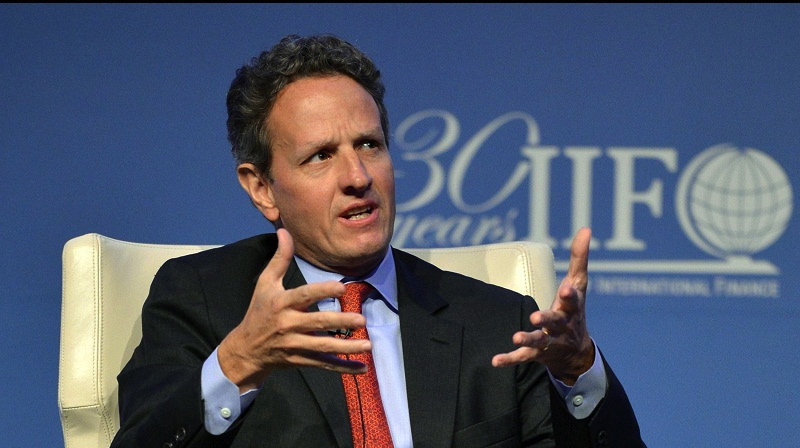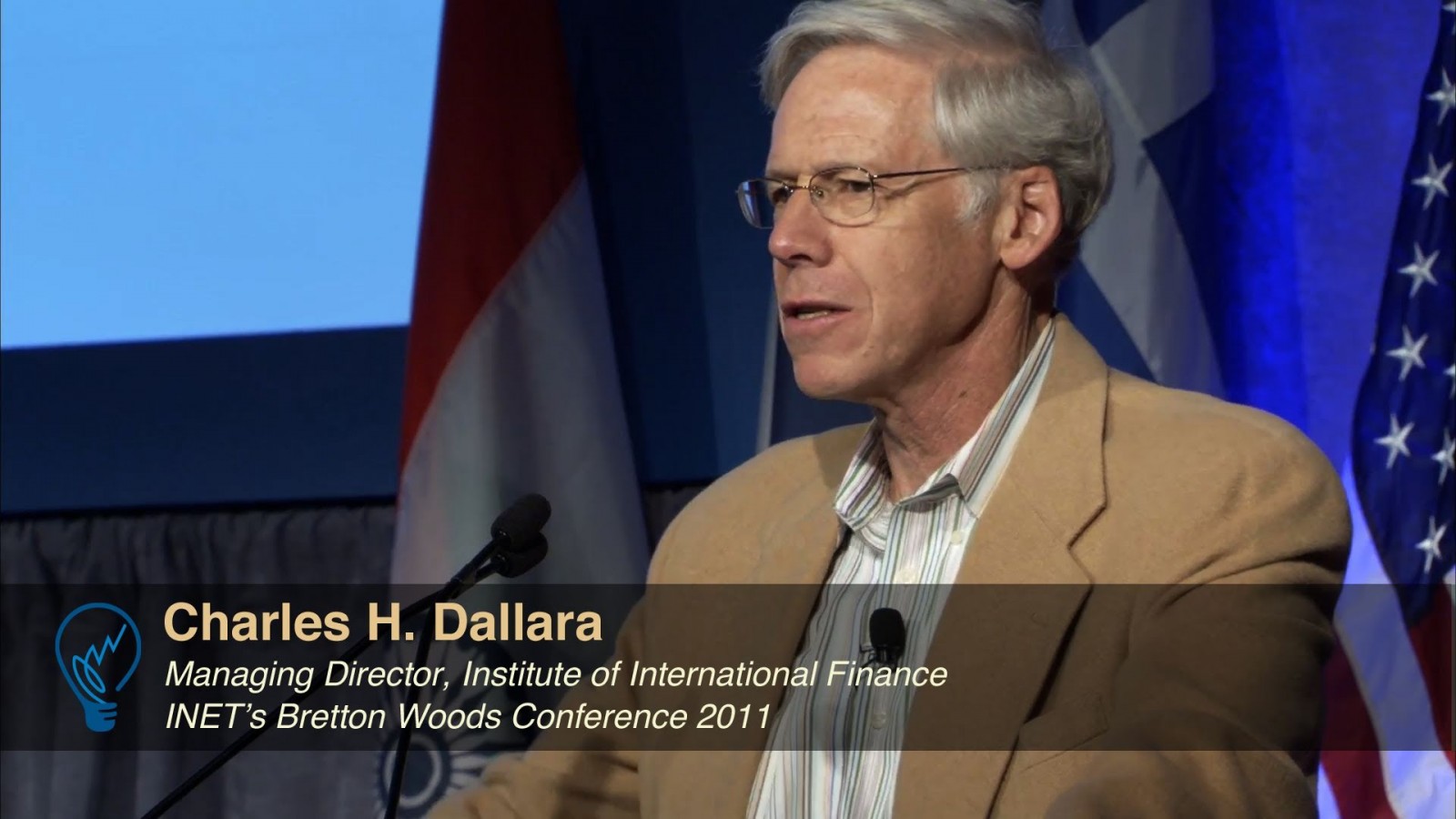
This is the first of a series of exposés focusing on the Institute of International Finance (IIF), the very “visible hand” of financial markets. It is a continuation of the Global Power Project produced by Occupy.com. Part 1 examines the origins of the IIF.
Founded in 1983, the Institute of International Finance (IIF) describes itself as “the world’s only global association of financial institutions” with a membership that includes “most of the world’s largest commercial banks and investment banks,” along with sovereign wealth funds, asset managers, hedge funds, insurance companies, law firms, multinational corporations, development banks, multilateral agencies, credit ratings agencies and an assortment of other global financial and economic organizations. In short, the Institute of International Finance is the very visible hand of the global financial markets.
As the IIF notes on its website, its "main activities" include providing so-called “impartial analysis and research” to its members in order to “shape regulatory, financial, and economic policy issues....influence the public debate on particular policy proposals....[and work] with policymakers, regulators, and multilateral organizations... with an emphasis on voluntary market-based approaches to crisis prevention and management."
It is also there to “provide a network for members to exchange views and offer opportunities for effective dialogue among policymakers, regulators, and private sector financial institutions.” The IIF proclaims it “is committed to being the most influential global association of financial institutions,” seeking to “sustain and enhance.... our extensive relationships with policymakers and regulators.”
The Institute of International Finance was formed at the beginning of the debt crisis of the 1980s, designed to establish a formal organization and representation for the interests of the world’s major banks and financial institutions. A meeting at Ditchley Park, England, was hosted by the National Planning Association (NPA) in May of 1982, which brought together senior representatives from major commercial banks in the industrialized Organization for Economic Co-Operation and Development (OECD) countries, as well as the Managing Director of the International Monetary Fund (IMF), Jacques de Larosiere; other top IMF and World Bank officials; the Comptroller of the Currency of the U.S., C.T. Conover; and the Head of Banking Supervision at the Bank of England, Peter Cooke, among many others. [1]
The meeting was designed to discuss the general international financial situation at the time. One of the main conclusions of the meeting was that banks needed access to more up-to-date and accurate information regarding the financial standing of debtor nations, for which it was felt that “an institution within the banking community might be created.” The information would be provided by major banks along with multilateral agencies such as the IMF, World Bank, and the BIS, which all “exhibited a willingness to assist in the efforts of the commercial banks... and to make as much data as possible available to the new institution.” [2]
The participants at the Ditchley meeting became known as the "Ditchley Group." But their suggestions for a new banking institution did not stop at creating a mechanism for making better information available to banks. The group also envisaged a role for the new institution to undertake meetings directly between debtor nations and private banks, and to send teams of officials to nations to meet with senior government representatives to conduct economic and financial "reviews" of various countries around the world.
The Ditchley Group agreed to invite other banking institutions from the OECD countries to meet and discuss the possibility of creating such an organization, and a second meeting – “Ditchley II” – was held in New York in October of 1982, with the participation of 31 major banks from the U.S., Japan, UK, France, Canada, the Netherlands, West Germany and Switzerland, along with officials from the World Bank, IMF, Bank of England and the BIS. [3]
The meeting resulted in an agreement to establish such an institution, termed a “nonprofit corporation,” to be based in Washington, D.C., which could “suggest independence” from the large Wall Street banks and also “because it would provide proximity to the headquarters of the IMF and the World Bank.”
The organization would have a small and expert staff, overseen by a board of directors made up of individuals from many of the banks with the largest exposure to international loans, and that membership would also be granted to other institutions with significant international exposure. On January 11, 1983, the Institute of International Finance was incorporated in Washington, D.C., with the participation of senior officers from 37 major banks from Europe, Japan, and North and South America. [4]
Among the original participating banks were: (from Canada) the Bank of Nova Scotia, Canadian Imperial Bank of Commerce, the Royal Bank of Canada, and the Bank of Montreal; (from France) Banque Nationale de Paris and Credit Lyonnais; (from Germany) Dresdner Bank, Commerzbank and Westdeutsche Landesbank; (from Japan) Bank of Tokyo and Mitsubishi Bank; (from Switzerland) Credit Suisse and Union Bank; (from U.K.) Barclays, Lloyds and Midland Bank; (from the United States) Bank of America, Bankers Trust, Chemical Bank, Citibank, Manufacturers Hanover Trust, Mellon Bank, Morgan Guaranty Trust, Chase Manhattan and the First National bank of Chicago. [5]
By the mid-1980s, the IIF had a membership of 189 banks from 39 countries, representing more than 80% of the total international bank exposure to the "Third World." And all this following the Institute's “ultimate aim” to “improve the process of international lending” in the midst of the 1980s debt crisis. [6]
While commercial banks established the Institute in order to “coordinate their activities” in the international arena, the banks and the powerful industrial nations and international organizations had worked to prevent such coordination from taking place among debtor nations of the Third World. The Group of 77 – a counterpart to the G7 which represents the majority of the word’s population – held a summit in 1983, where the debt crisis was of major concern.
The Latin American debtor nations, in particular, “were under considerable pressure from the U.S., the European Economic Community (EEC) and the IMF/World Bank not to entertain any idea of a "'debtor’s cartel,' or even to exchange and coordinate information.” So while the world’s major banks established a formal organization which essentially functions as an institutional banking cartel, the world’s debtor nations were pressured to avoid even sharing information with one another regarding the debt crisis. [7]
Thirty years after it was founded, the IIF today boasts a membership of more than 450 institutions in over 70 countries around the world. The IIF hosts a series of meetings every year, the most prominent being its semi-annual full membership meetings, taking place over the course of two days with presentations by private bankers and public officials and including roughly 800 members and guests.
The speakers at these events, according to the IIF report "The First 25 Years," constitute “a Who’s Who of international financial policymakers and leaders of the global financial industry.” William R. Rhodes of Citigroup (and a former top IIF official) referred to the meetings as ensuring that the IIF became “the leadership organization of its kind.” [8]
The Managing Director of the Institute of International Finance from 1993 until 2013 was Charles Dallara, who had previously served as a managing director at JPMorgan & Co. from 1991 until 1993. Prior to his banking career, Dallars was the U.S. Executive Director of the IMF from 1984 until 1989, and held senior positions in the U.S. Treasury Department between 1983 and 1989. Today, Dallara is a member of the Council on Foreign Relations, the Executive Vice Chairman of the Board of Directors of Partners Group, a member of the boards of the Bertelsmann Foundation and the National Bureau of Economic Research, the Vice Chair of the Board of Overseers of the Fletcher School of Law and Diplomacy at Tufts University, and is a member of the International Advisory Board of the Instituto de Empresa.
The current president and CEO of the IIF is Timothy D. Adams, the former managing director of The Lindsey Group and former Under Secretary of the Treasury for International Affairs from 2005 until 2007, prior to which he served as the Chief of Staff to the U.S. Treasury Secretary from 2001 to 2003. Adams is concurrently a member of the board of the Atlantic Council, a member of the Atlantic Council’s Business and Economics Advisors Group, a Senior Advisor at the Center for Strategic and International Studies, a director of the Center for Global Development, a delegate at the China Development Forum, a member of the Council on Foreign Relations, and a member of the Business 20 (B20), a counterpart conference to the G20 meetings designed to provide the input of the world’s business community to the leaders, finance ministers and central bank governors of the world’s leading twenty nations.
The Institute of International Finance (IIF) represents the very "visible hand" of financial markets, wielding immense influence and boasting unparalleled access to central bankers and top policymakers from around the world. Look for the next parts in this series on the IIF as part of Occupy.com’s Global Power Project.
Andrew Gavin Marshall is a 26-year old researcher and writer based in Montreal, Canada. He is Project Manager of The People’s Book Project, chair of the Geopolitics Division of The Hampton Institute, research director for Occupy.com’s Global Power Project, and hosts a weekly podcast show with BoilingFrogsPost.
References:
[1] Walter Sterling Surrey and Peri N. Nash, “Bankers Look Beyond the Debt Crisis: The Institute of International Finance, Inc.,” Columbia Journal of Transnational Law (Vol. 23, 1985-1985), pages 111-113. [2] Ibid. [3] Ibid, pages 113-114. [4] Ibid, pages 114-115. [5] Ibid, page 115. [6] Ibid, pages 117-118. [7] Robert E. Wood, “The Debt Crisis and North-South Relations,” Third World Quarterly (Vol. 6, No. 3, July 1984), page 714. [8] IIF, The First 25 Years: 1982-2007 (Institute of International Finance, 2007), page 26.
3 WAYS TO SHOW YOUR SUPPORT
- Log in to post comments















